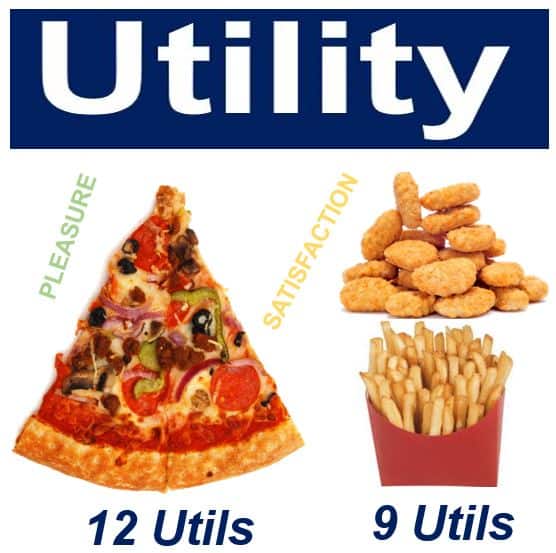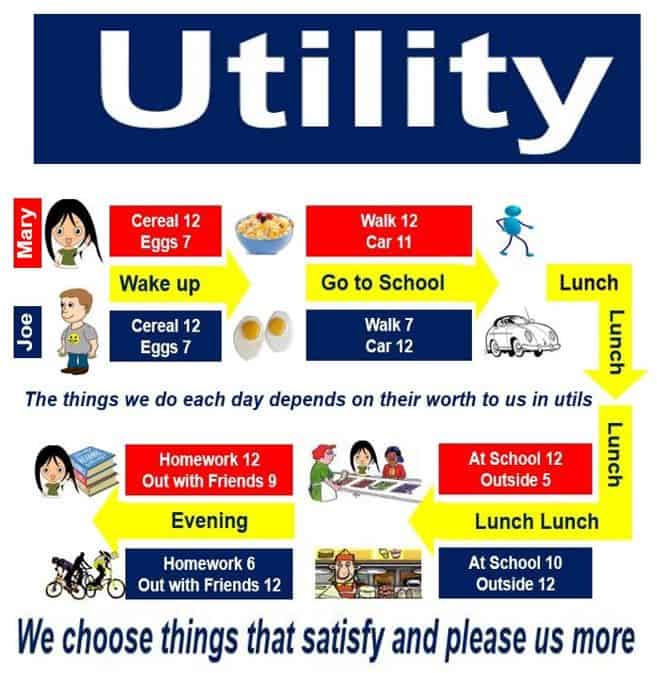Utility has several meanings: In economics, it refers to the value for money that people derive from consuming a product or service. In this sense, we also use the term when talking about being somewhere. Value for money, in this context, means ‘pleasure and satisfaction.
In the world of business, it means a water, gas, or electricity company.
The term may refer to a software program that helps maintain or improve the efficiency of a computer system.
In patent law, it is the usefulness of something you want to patent. If you invent something and want to patent it, it must have a useful function.
The utility of something in non-patent legal speak can also refer to how useful it is.
This article focuses on utility when it refers to the pleasure or satisfaction people feel when consuming a good or service.
Daniel Bernoulli (1700-1782), a Swiss physicist and mathematician, first introduced the term with this meaning.
Utility is economist-speak for a good thing, i.e., it is a measure of satisfaction. Consumers give each product or service that they purchase a util rating. Underlying most economic theory is the assumption that we do things because they give us pleasure and satisfaction.
Utility – a measure of pleasure
Utility is the way economists measure pleasure or happiness and how that relates to the decisions we make. Specifically, how it relates to how we ‘as consumers’ make decisions.
It measures the benefits or drawbacks of consuming something, experiencing something, or taking part in an event.
This measure directly influences demand, which determines the price of goods and services.
Measuring a consumer’s utility is not easy. The concept is a key underpinning of rational choice theory in game theory and economics. We can determine it indirectly with consumer behavior theories. Consumer behavior theories all assume that we all strive to maximize utility.
Do not confuse the term with utilitarianism. Utilitarianism suggests that an action is good if it results in more happiness than unhappiness for lots of people.
Util – a unit of utility
Classical economists believed that we could measure all utilities as a hard number. In other words, they thought we could give each one of them a score.
Classical economists created the ‘util.’ A util represents how much psychological satisfaction a product generates for a subset of consumers in many different situations.
Let’s suppose I judge that chicken nuggets with French fries yield 9 utils and an American Hot pizza yields 12 utils. I know that the pizza will be more satisfying.

Virtually everything has util value
We can measure practically everything we choose to do or buy in utils. For example, eating an apple, living in a certain house, or voting for a particular candidate has util value. So does receiving a wireless phone plan or driving a sports car.
Some things may even have a negative score. A woolen sweater, for example, for somebody with extremely sensitive skin, has negative util value.
Every decision we make in our daily lives has to do with utils. We compare different options’ util scores before choosing one.
For example, imagine Mary wakes up in the morning and must choose between cereal or eggs for breakfast. In an instant, Mary compares the satisfaction, pleasure, and benefits she would derive from each one. She subsequently chooses to have eggs.
Mary’s mother, who must take her to school, can either walk or drive. Her mother considers the benefits of walking – exercise and fresh air. She then compares them to the benefits of driving – saving time and sitting in comfort. She decides to drive.
We are unique
We measure utility according to how much somebody values a particular good. This entirely depends on that person’s preferences, and not from some universal or external measure.
A pizza and chicken nuggets may give utility values of 12 and 9 respectively to one consumer. However, they may give 5 and 13 respectively to another.
In ordinary cases, utility is used to denote how useful something is, however, in economics we use it in a much wider sense.
We cannot take utils as a standard unit because it will vary from person to person. Economists say that we can measure utility according to how much the consumer is willing to pay.
The psychological satisfaction associated with consuming a product or service often extends beyond the initial purchase, influencing future consumer behavior and brand loyalty.
The pursuit of utility in consumption not only drives personal buying decisions but also shapes broader market trends and economic models.”

What is ‘total utility’
What is the most satisfaction I can derive from eating American Hot pizza? One portion is worth 12 utils. Does that mean that I get 120 utils if I consume ten portions consecutively? No, it doesn’t.
We can only eat so many portions in one go. Also, the second is worth fewer utils than the first, and the third fewer than the second, etc.
I can only consume three portions of pizza. The first slice yields 12 utils, the second 9 and the third 7. Its total utility is 12 + 9 + 7 = 28 utils.

With some products, services, or events, the utils we assign to them diminish very sharply upon repetition.
For example, the first time I saw the film ‘Terminator,’ I gave it 20 utils – I was thrilled. Had somebody forced to watch it again that day, I’d have given it a score of five. ‘Terminator’ would have been worth zero utils had somebody compelled me to watch it a third time.
What is marginal utility?
Marginal utility is the additional utility individuals derive by consuming one more unit of something. We also refer to it as MU. It is the utility we derived from the last portion or unit of something we purchased.
In the pizza example above, slice 1 = 12 utils, slice 2 = 9, and slice 3 = 7. When I consume the third portion, the total increases from 21 to 28 utils. The additional seven utils from the third (the last) portion is the MU.
 In this quote, the word ‘utility’ has a different meaning. According to Dictionary.com, a ‘utility man’ is: “1. A worker who will serve in any capacity when called on. 2. An actor of miscellaneous small parts. 3. (Baseball) A player who is not a regular and whose value lies in an ability to play several positions. (Image: legendsinconcert.com)
In this quote, the word ‘utility’ has a different meaning. According to Dictionary.com, a ‘utility man’ is: “1. A worker who will serve in any capacity when called on. 2. An actor of miscellaneous small parts. 3. (Baseball) A player who is not a regular and whose value lies in an ability to play several positions. (Image: legendsinconcert.com)
In the words of Sir Sydney John Chapman (1871-1951):
“Marginal utility is addition made to total utility by consuming one more unit of a commodity.”
Chapman was an English economist who was Chief Economic Adviser to the British government from 1927 to 1932.
A public utility is a company that supplies consumers with natural gas, water, electricity, etc.
Video – What is Utility?
This video, from our YouTube partner channel – Marketing Business Network – explains what ‘Utility’ is using simple and easy-to-understand language and examples.
